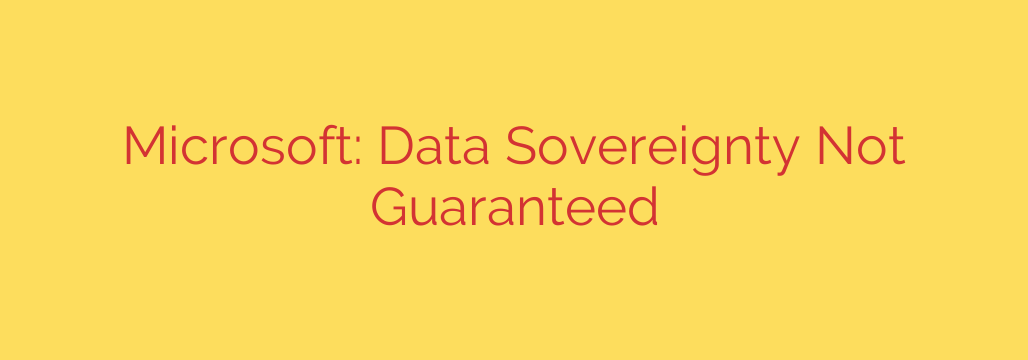
Is Your Data Safe in the Cloud? A Closer Look at Data Sovereignty and Microsoft
Many businesses operate under a common-sense assumption: if you store your data in a cloud data center located in your own country, it’s protected by your country’s laws. This concept, known as data sovereignty, is a cornerstone of modern data privacy strategies, especially for organizations handling sensitive information.
However, the reality of global data storage is far more complex. Even if your data resides on a server in Frankfurt, Dublin, or Toronto, it might still be subject to the laws of another nation entirely. Recent clarifications from major cloud providers like Microsoft highlight a critical truth: choosing a local data center from a U.S.-based company does not guarantee your data is exempt from U.S. jurisdiction.
This isn’t a failure of technology, but a function of international law that every business leader, IT manager, and compliance officer needs to understand.
Data Residency vs. Data Sovereignty: A Crucial Distinction
To grasp the issue, it’s vital to know the difference between two often-confused terms:
- Data Residency: This refers to the physical or geographic location where your data is stored. You can often choose a specific region (e.g., “Germany Central”) when setting up your cloud services.
- Data Sovereignty: This is a legal concept. It dictates that data is subject to the laws and regulations of the nation in which it is located.
The core of the problem is that for U.S.-based technology companies, data residency does not ensure data sovereignty.
The U.S. CLOUD Act: A Global Reach
The primary driver behind this issue is the U.S. Clarifying Lawful Overseas Use of Data (CLOUD) Act. Passed in 2018, this federal law gives U.S. law enforcement the authority to compel American tech companies to provide requested user data, regardless of where that data is stored globally.
Here’s the key takeaway: If the cloud provider is headquartered in the United States, it must comply with lawful U.S. data requests. This means that even if your company is based in the EU and your data is stored in an EU data center, a U.S. court order or warrant could legally require Microsoft, Amazon, or Google to hand over that data.
While tech giants often challenge broad data requests in court, they are ultimately bound by the laws of their home country. Microsoft itself has been transparent about its legal obligations, confirming that its promises of data residency, such as its “EU Data Boundary” initiative, are technical and logistical—not a legal shield against U.S. law.
What This Means for Your Business
For organizations subject to strict privacy regulations like the GDPR in Europe or other national data protection laws, this creates a significant compliance challenge. Storing data with a U.S. cloud provider could potentially put you in conflict with local regulations that prohibit data transfers to foreign governments without due process.
The critical point for any organization to understand is that the nationality of your cloud provider can be as important as the location of their data center. While major cloud platforms offer unparalleled technology and security, this jurisdictional issue is a risk that cannot be ignored.
Actionable Steps to Protect Your Data
Understanding the problem is the first step. Taking proactive measures is the next. While no single solution is foolproof, you can significantly enhance your data’s security and privacy posture.
Embrace “Zero-Trust” Encryption: The most powerful defense is to ensure the cloud provider cannot read your data. Implementing a robust encryption strategy where you—and only you—control the encryption keys is paramount.
- Hold Your Own Key (HYOK) or Bring Your Own Key (BYOK): These services, offered by most major cloud providers, allow you to manage your own encryption keys. If Microsoft doesn’t possess the keys, they cannot decrypt your data to comply with a request. They can only hand over a useless, encrypted file.
Conduct a Data Audit: Understand and classify your data. Not all information carries the same level of risk. Mission-critical intellectual property or personally identifiable information (PII) may require stronger protections or even storage with a non-U.S., local cloud provider.
Consult Legal and Compliance Experts: This is not just a technical issue; it’s a legal one. Work with experts who understand the nuances of international data law, the CLOUD Act, and GDPR. They can help you draft contracts and implement policies that align with your risk tolerance.
Explore Sovereign Cloud Options: For the most sensitive data, consider using cloud providers headquartered in your own legal jurisdiction. These providers are not subject to the U.S. CLOUD Act and can offer a stronger guarantee of data sovereignty, though you may need to evaluate trade-offs in features and scale.
In today’s interconnected world, achieving true data sovereignty is a complex task. By understanding the legal landscape and implementing a security-first approach centered on encryption, you can take meaningful steps to protect your most valuable asset: your data.
Source: https://go.theregister.com/feed/www.theregister.com/2025/07/25/microsoft_admits_it_cannot_guarantee/








